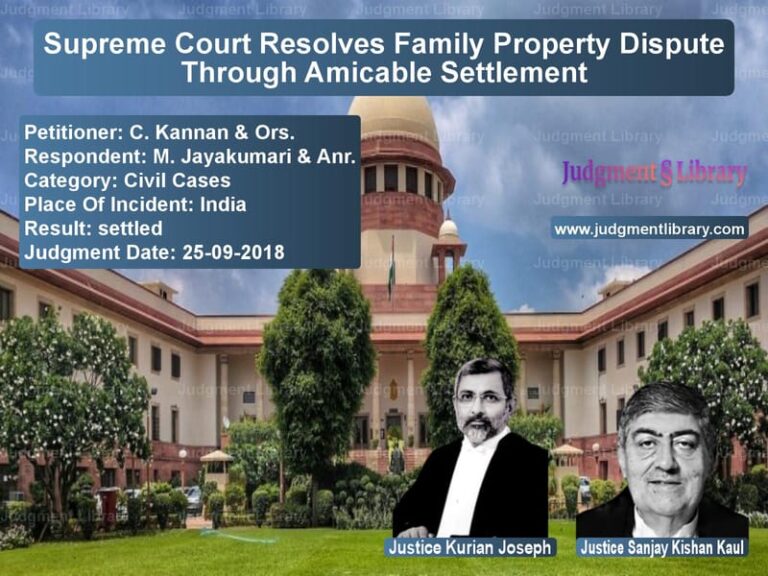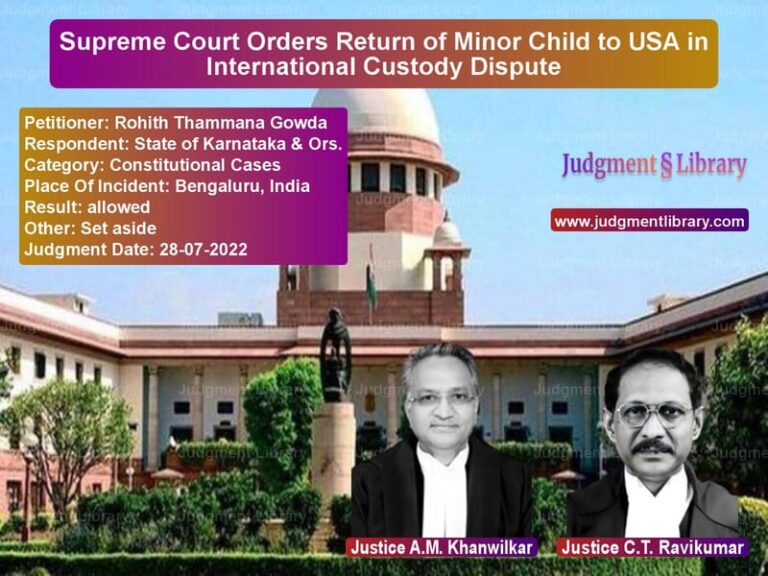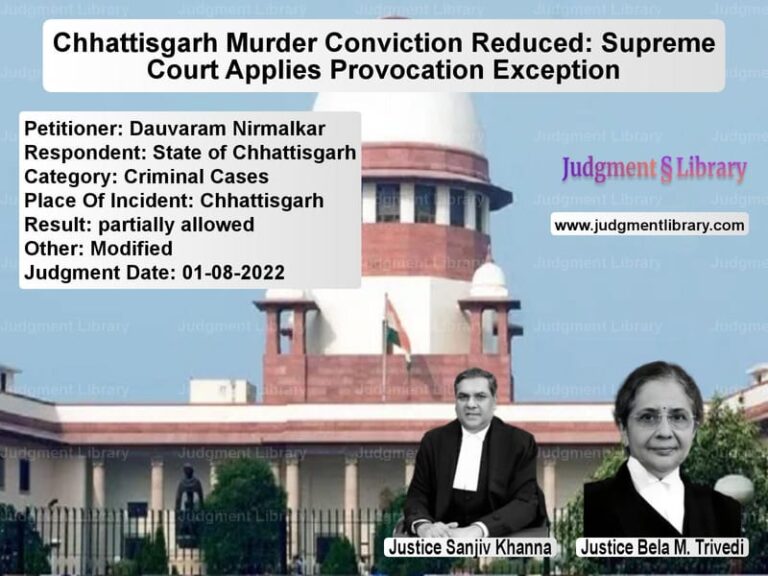Consumer Rights and Builder Accountability: Supreme Court’s Decision in Dharmendra Sharma vs. Agra Development Authority
The case of Dharmendra Sharma vs. Agra Development Authority revolves around the rights of homebuyers and the responsibilities of development authorities when it comes to delivering residential projects. The dispute was heard by the Supreme Court in Civil Appeal Nos. 2809-2810 of 2024 and Civil Appeal No. 6344 of 2024, where the key issue was whether a development authority can demand additional charges and delay possession while still holding the homebuyer responsible for financial obligations.
The ruling of the Supreme Court in this case highlights the importance of consumer rights, fair trade practices, and the obligations of developers under consumer protection laws. The judgment also delves into the issues of limitation period, completion certificates, and compensation for delays.
Background of the Case
The case stems from a residential housing scheme launched by the Agra Development Authority (ADA) under the name ADA Heights, Taj Nagari, Phase II. The appellant, Dharmendra Sharma, applied for the allotment of a Super Deluxe 2 flat in 2011 and paid the booking amount of Rs. 4,60,000. The total tentative price of the flat was Rs. 56,54,000, and the appellant chose to make a lump sum payment rather than paying in installments.
However, despite paying nearly Rs. 60 lakhs (including additional charges) for the flat, the appellant never received possession. The ADA repeatedly failed to provide necessary approvals and completion certificates, leading to a legal dispute over delayed possession and unfair demands for additional charges.
Key Events Leading to Litigation
- In 2011, the appellant applied for the flat and made the full payment.
- Possession was to be given within six months, but it was not delivered.
- In 2014, ADA demanded additional charges, including for a solar system, lease premium, and covered parking.
- The appellant inspected the flat and found significant deficiencies.
- In 2019, the appellant paid Rs. 3,43,178 after multiple demands but still did not receive possession.
- In 2020, the appellant filed a consumer complaint before the National Consumer Disputes Redressal Commission (NCDRC).
- In 2023, the NCDRC ruled in favor of the appellant, ordering ADA to refund the amount paid with 9% annual interest from the date of the complaint.
- Both parties appealed to the Supreme Court, leading to the present judgment.
Legal Issues Raised
- Whether the demand for additional charges beyond the agreed price was justified.
- Whether the delay in providing possession was the fault of the developer or the homebuyer.
- Whether the absence of a completion certificate and firefighting clearance made the offer of possession legally invalid.
- Whether the consumer complaint was barred by limitation under Section 24A of the Consumer Protection Act.
- Whether the NCDRC had the pecuniary jurisdiction to hear the complaint.
Supreme Court’s Analysis and Judgment
The Supreme Court, comprising Justice Vikram Nath and Justice Prasanna Bhalachandra Varale, delivered a detailed judgment analyzing each of the legal issues raised by the parties.
1. Delayed Possession and Deficiency in Service
The Court ruled that the delay in handing over possession was primarily due to the failure of the ADA to complete construction and obtain necessary approvals. The ADA had failed to provide a completion certificate and firefighting clearance, both of which are essential for legal possession.
Referring to past judgments, the Court held that offering possession without these certificates was legally invalid. It cited the case of Debashis Sinha vs. R.N.R. Enterprise, where the Court had ruled that possession cannot be enforced without statutory clearances.
2. Unjustified Additional Charges
The Court examined the demand for additional charges and held that while some charges were contractually valid, others were not. It noted that the solar system, lease premium, and parking charges were not explicitly agreed upon in the initial contract.
The Court observed that “a homebuyer cannot be made to bear costs that were not disclosed at the time of agreement.”
3. Limitation Period
The ADA argued that the consumer complaint was filed after the statutory period of two years from the cause of action, as prescribed under the Consumer Protection Act.
The Supreme Court rejected this argument, holding that the cause of action remained active due to continuous communications between the parties. The ADA’s reminders and acceptance of payment in 2019 extended the limitation period.
4. Pecuniary Jurisdiction of NCDRC
The ADA contended that the NCDRC lacked jurisdiction because the total monetary claim was below Rs. 1 crore. The Supreme Court dismissed this argument, stating that the claim was not just for the deposited amount but also for compensation, mental agony, and legal costs, which brought the total claim above the pecuniary threshold.
Final Order by the Supreme Court
The Supreme Court modified the NCDRC’s order and provided additional relief to the appellant:
- The entire amount deposited by the appellant shall be refunded with 9% annual interest from July 11, 2020, until the date of payment.
- The appellant is entitled to additional compensation of Rs. 15 lakhs for mental agony and harassment.
- The ADA must return the non-judicial stamp papers worth Rs. 3,99,100.
- No exemplary costs were imposed on either party.
- The ADA’s appeal was dismissed, and the consumer’s appeal was partially allowed.
Key Takeaways from the Judgment
- Builders and development authorities must obtain all necessary approvals before offering possession.
- Additional charges that are not contractually agreed upon cannot be imposed on homebuyers.
- Consumer complaints related to continuous transactions are not time-barred.
- Compensation for mental agony is valid in cases of extreme delay and harassment.
- Pecuniary jurisdiction includes all monetary claims, not just the deposited amount.
Conclusion
The Supreme Court’s ruling in Dharmendra Sharma vs. Agra Development Authority is a significant victory for homebuyers. It reinforces the principles of fair trade, transparency, and accountability for development authorities. The judgment also highlights the role of the judiciary in ensuring consumer protection and preventing exploitation by real estate developers.
Petitioner Name: Dharmendra Sharma.Respondent Name: Agra Development Authority.Judgment By: Justice Vikram Nath, Justice Prasanna Bhalachandra Varale.Place Of Incident: Agra, Uttar Pradesh.Judgment Date: 06-09-2024.
Don’t miss out on the full details! Download the complete judgment in PDF format below and gain valuable insights instantly!
Download Judgment: dharmendra-sharma-vs-agra-development-aut-supreme-court-of-india-judgment-dated-06-09-2024.pdf
Directly Download Judgment: Directly download this Judgment
See all petitions in Property Disputes
See all petitions in Consumer Rights
See all petitions in Damages and Compensation
See all petitions in Judgment by Vikram Nath
See all petitions in Judgment by Prasanna Bhalachandra Varale
See all petitions in partially allowed
See all petitions in Modified
See all petitions in supreme court of India judgments September 2024
See all petitions in 2024 judgments
See all posts in Civil Cases Category
See all allowed petitions in Civil Cases Category
See all Dismissed petitions in Civil Cases Category
See all partially allowed petitions in Civil Cases Category







